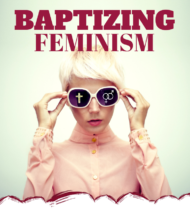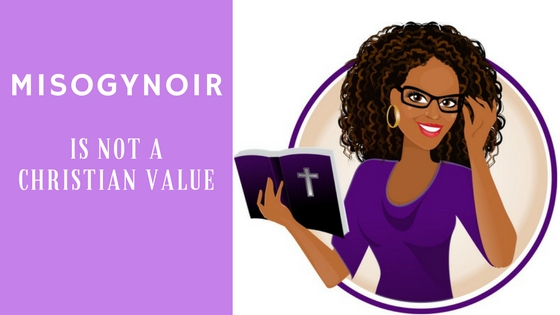“Misogynoir”: coined by Black feminist and professor Moya Bailey to describe a kind of misogyny that Black women face that combines both racism and sexism.
In our research we come across many men and women from diverse backgrounds who offer new insights in what it means to be a Christian and a feminist. We’re grateful for a Q&A today with Kimberly Peeler-Ringer from The Churched Feminist, also featured in our Christian feminist photo campaign.
Kimberly brings a wealth of experience and insight into the ‘multiple layers of prejudice” against Black women in the church, and ways in which she helps women rise from the both subtle and blatant impact of patriarchy and misogynoir.
Kimberly answers a few important questions and offers valuable insights on topics we’ve been exploring in our film research.
Kimberly is a licensed minister, teaching and preaching the words of the Bible for more than two decades. She holds graduate degrees in biblical and religious studies from the Morehouse School of Religion at the Interdenominational Theological Center in Atlanta, Georgia and Vanderbilt University in Nashville, Tennessee. Her research focuses on the women in the Gospel of John.
She is a professional writer and editor, a gifted teacher who has taught Bible courses in both the traditional and virtual classrooms; a sought after speaker and workshop leader, a former television news producer, and Christian Education consultant. She is one of many contributors to the New Interpreter’s Bible Dictionary multi-volume series by Abingdon Press. She specializes in training Sunday school teachers, instruction in utilizing media in ministry, and developing Christian Education courses that use biblical narratives to empower women.
1. What is needed today to raise awareness about the (double) discrimination of being a woman of color in the church?
I think what is needed today to raise awareness about the multiple layers of prejudice Black women in America face is a strenuous examination of our Christian tradition. You may have heard the story of three generations of women passing down a recipe for baking a ham. As the daughter watched her mother carefully rubbing spices into the skin and cutting off the ends of the ham before placing it in the oven, she asked her mother why she cut the ends off. Her response: “my mother did it that way.” Fortunately, the daughter’s grandmother was still living, and she asked her why she cut the ends off of her ham, and her grandmother replied: “because I didn’t have a pan large enough.” Think of all that meat wasted due to an unexamined tradition! I see echoes of this in the early Black church, as Black women called to ministry sat on their gifts and deferred to male leadership because of the bad history in this country that told us we were a) unworthy of worshipping with, hence the need to create the black church in the first place). Black masculinity had been so debilitated by slavery, Jim Crow, and segregation that the early Black church became a rare space where a Black man could be respected, to be called “Rev’rin” instead of “boy.” This deference became a tradition of its own; this thinking that pulpits are male spaces only and unfortunately, remains the default setting for too many contemporary Black churches. I don’t believe God is sexist, and I don’t believe that men have something in common with Divinity that women and children do not. Jesus is our greatest example of the need to investigate traditions. Wherever the New Testament quotes Jesus as saying, “you have heard it said, but I say unto you,” I believe Jesus was challenging the traditions of his own religious leaders.
2. In what profound ways are womanists rising and speaking out as activists?
Whenever a Black woman preaches using her own experiences as a Black woman in America as her point of departure, or challenges the persistent stereotypes about Black womanhood, or interrogates the socio-cultural realities that make self-love difficult, she is engaging in womanist/feminist activism. And beyond the pulpit moment, many women of color, myself included, are blogging about their own church experiences of sexism, prejudice, shaming, and teachings about marriage and womanhood that we have internalized in ways that have harmed us and worse, weakened our faith. I consider myself a digital minister of sorts because I use the internet to create community for women; to create safe spaces to discuss and bond and not feel as though we are the only ones who resist those patriarchal renderings of the Bible that attempt to force us to conform and contort into the narrow boxes of what Black Christian womanhood has been predetermined to be.
3. We feel Christian patriarchy has caused a sort of post-traumatic stress for women — what are a few ways women can rise from the damaging effects of patriarchy?
I like this notion of patriarchy as post-traumatic stress; I have to work on myself to remove the residue of patriarchal notions in my own life, notions that suggest all women should be satisfied by the same things. I resist internalizing the patriarchal presentation of divinity by reminding myself “God is a brown girl too.” It reminds me that God exists in all of us, over and above the negative presentations we may have internalized about who God is and who God loves. I take rising from patriarchal effects and recovery seriously, and use it as a starting point in my own theology: whenever I teach or preach I make a very deliberate effort to recover the voice of the silenced in the text. An example might be The Parable of the Prodigal Son, which could also be rendered The Parable of the Absent Mother. I never miss an opportunity to remind women—women of color in particular—that the Bible can be used to liberate or oppress; it’s simply a matter of whose hand it is in at the time. I also use inclusive language. I think it is important to remind women that much of what is lifted from the Bible as a blueprint for womanhood is coming from a man’s interpretation or perspective of what that is. There are many ways of being on this Christian journey. When we start accepting that, and stop trying to win the ‘my way is right’ argument, we can begin to heal. Gloriously.
It’s also a treat to read relevant blogs by Kimberly:
How to Use the Bible to Talk About Race
The Hard Choice of Confronting Prejudice in the Church
A Litany for Black Children Who Become Collateral Damage
Church Picnic Theology and Feminist God Talk
You can learn more about Kimberly here:

